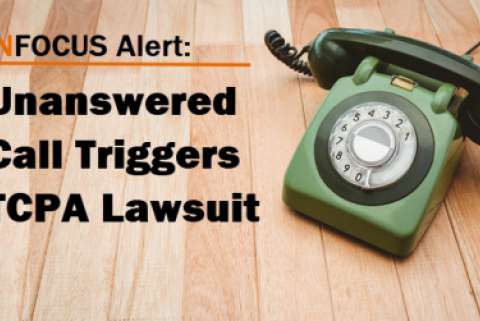The U.S. Court of Appeals for the Third Circuit recently ruled that a single pre-recorded message left on someone’s voicemail is cause for a TCPA lawsuit. The complaint, filed in New Jersey, alleged that the company’s one-minute voicemail promoting gym membership violated the TCPA. In July, the court decided that the case against Work Out World Inc. could proceed. That decision was followed by a second appeal in November which again resulted in the court’s refusal to dismiss the lawsuit.
The Telemarketing Phone Call
The story began on July 28, 2015 when Noreen Susinno received a call on her cell phone from Work Out World which she did not answer. That call went to voicemail where the fitness club left a one-minute, pre-recorded promotional message.
Based on that one call, Ms. Susinno filed a class action complaint in the U.S. District Court for the District of New Jersey against Work Out World (WOW). She alleged that the company’s call and voicemail message violated the TCPA’s (Telephone Consumer Protection Act) prohibition against pre-recorded calls to cell phones.
Upon initial review, the court dismissed Ms. Susinno’s complaint. They concluded that a single solicitation was not “the type of case that Congress was trying to protect people against,” and her receipt of the call and voicemail did not constitute a concrete injury.
The case didn’t stop there. Fueled by the potential to recover uncapped statutory damages of between $500 and $1,500 per violation, Ms. Susinno appealed the ruling to the Third Circuit.
On Appeal: Does The Lawsuit Satisfying The “Standing” Requirement?
In a surprising move, the Third Circuit reversed the district court’s dismissal and remanded the case for further proceedings. In addressing the appeal, the Third Circuit was presented with two questions:
- Did the TCPA forbid Work Out World’s conduct? If so, did the conduct cause harm that satisfies Article III’s standing requirement?
- Did the alleged injury satisfied the concreteness component of Article III’s standing requirement?
Note: For Article III standing, the plaintiff must show that he or she has suffered "injury in fact".
The court relied on the TCPA’s text and Congress’ finding that pre-recorded calls are a nuisance. They concluded that the alleged injury implicated the same interests as a traditional common law cause of action—intrusion upon seclusion (i.e. invasion of privacy). In doing so, the Third Circuit found that the plaintiff satisfied the concreteness component of Article III’s standing requirement.
The court’s final decision was to reinstate the TCPA claim against Work Out World, allowing the lawsuit to proceed.
Second Appeal: The Defendant’s “Pick-off” Strategy
After losing their appeal, Work Out Word took a bold legal move. They attempted to resolve the lawsuit with Ms. Susinno and stop the class action by depositing $1,501 into her credit card account ($1,500 being the legal statutory max per TCPA violation). Work Out World then took the position that they had now settled the claim with Ms. Susinno. This became the basis for Work Out World’s attempt to have the lawsuit dismissed on the grounds that they had provided financial relief to Ms. Susinno.
Ms. Susinno argued that she had rejected the settlement offer and said the money from Work Out World had NOT been deposited into her credit card account, but that of her employer.
“Here, it is apparent that Work Out World sought settlement with plaintiff in an attempt to thwart class certification.”
– U.S. District Judge Peter Sheridan.
Pick-off settlements have been the subject of much controversy among litigators. The strategy is designed to “pick off” the lead plaintiffs in class actions by paying them full relief to settle their individual claims. In 2016 the court addressed this issue in their Campbell-Ewald decision. The ruling from that case barred settlement OFFERS designed to “pick off” lead plaintiffs in class actions, but provided no opinion on the situation where the defendant PAID the relief funds.
In Noreen Susinno v. Work Out World, Judge Sheridan ruled that Work Out World failed to show how its settlement offer to Ms. Susinno constituted complete relief for the entire class. Therefore, the lawsuit against Work Out World will continue.
Conclusion
The ruling in Noreen Susinno v. Work Out World has significant implications for defendants who challenge the TCPA and other cases at the pleading stage. Before this decision, it seemed inconceivable that a single, unanswered, and uncharged pre-recorded phone call and voicemail could be in violation of the TCPA, let alone have concrete injury sufficient to grant standing. The reality for marketers is that the court’s rational for the outcome in this case will make it harder for defendants to win motions to dismiss based on the apparent lack of concrete harm.
87% of TCPA Cases Granted Standing in District Courts.
The primary issue in this case is the issue of “standing”. Analysis of the Article III “standing requirement”, conducted by Law360 in May 2017, found that district courts had granted “standing” in 87% of the TCPA cases decided in the 12 months since the Spokeo v. Robins ruling. For comparison, the same analysis conducted 6 months after the ruling stood at 79%.
Defense attorneys should be concerned that it is possible for something as insignificant as one voicemail message to suffice standing. The Susinno ruling has substantially lowered the bar for what constitutes a concrete injury. It’s now possible for plaintiffs to allege that a federal statute was violated to establish Article III standing. Unfortunately, this may be the beginning of a new trend for TCPA cases where plaintiffs no longer need to allege actual injury resulting from a statutory violation.





